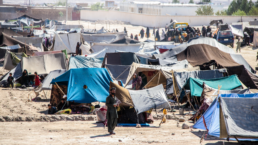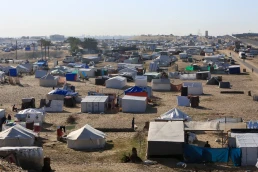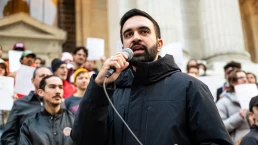The freezing of Afghanistan’s Central Bank Funds is hurting ordinary Afghans, causing people to sell organs or their own children. Biden must act.
By Staff, American Friends Service Committee
Forty-five humanitarian, human rights, peacebuilding, veterans’, faith-based, 9/11 victims’, working class, and diaspora community groups are calling for the Biden administration to allow the Afghan central bank access to the roughly $7 billion in reserve assets held in the United States in order to alleviate the ongoing humanitarian crisis in Afghanistan. The groups sent a letter today to the White House, warning that the current crisis could kill more people than have died in 20 years of the U.S.-led war in the country.

“While the world’s attention has turned to the crisis in Ukraine, it is extremely important that we not forget what is happening in Afghanistan, a country which is now experiencing the worst year in its recorded history,” said Masuda Sultan, co-founder of Unfreeze Afghanistan. “The continued economic strangulation of this nation may bring about consequences that will be far more costly to resolve if not addressed right away.”
When the Taliban took over the government in Kabul last August, the nation’s independent central bank was blocked from accessing its foreign reserves, contributing greatly to Afghanistan’s dire economic crisis. On February 11, the Biden administration announced that it was splitting these reserves, half of which would be set aside for an as-yet-undetermined form of assistance to Afghanistan, and half of which would be held for potential compensation for families of victims of the September 11, 2001 terrorist attacks in the U.S. This prompted a backlash, including from some families of 9/11 victims, who have warned of the food insecurity and deprivation that threatens millions of people in Afghanistan. “The Biden Administration has a moral obligation to unfreeze the $7 billion dollars in Afghanistan’s central bank, Da Afghanistan Bank (DAB). The freezing of international aid when Afghans are facing increasing hunger, repression, and violence is cruel and unethical,” said Kerri Kennedy, Associate General Secretary for International Programs at the American Friends Service Committee.
“Traveling to Kabul on a women’s delegation last month I saw firsthand how the freezing of Afghan Central Bank Funds is hurting ordinary Afghans,” said Kelly Campbell, co-founder, 9/11 Families for Peaceful Tomorrows. “We saw evidence of severe economic distress such as women waiting in bread lines, middle class families trying to sell their living room furniture on the side of the road, and malnourished children at food distribution sites. Unfreezing the Afghan central bank funds is crucial to a functioning economy and there is no excuse for the US to continue holding these funds for 9/11 family lawsuits or any other purpose. The central bank money clearly belongs to the Afghan people and they need it returned to them now.”
The letter cites testimony from people in Afghanistan who have been forced to sell their organs, or in other cases, their children, in order to survive.
“An economy cannot function without a central bank, and a central bank cannot function when its reserves have been confiscated,” said Mark Weisbrot, economist and co-director at the Center for Economic and Policy Research (CEPR). “The Biden administration’s decision to deprive Afghanistan’s central bank of its international reserves has had a major role in the collapse of the Afghan economy and the resulting crisis of severe hunger and acute malnutrition — as Human Rights Watch has emphasized. With a stroke of a pen, President Biden can reverse this senseless policy — and for the sake of the Afghan people, he must.”
The letter notes that the humanitarian assistance the Biden administration is offering is no substitute for the central bank’s role in maintaining a working financial system and economy.
“Afghanistan’s leading women’s rights advocates have been clear: the Biden administration’s decision to seize and distribute their assets is theft,” Yifat Susskind, Executive Director of MADRE, said. “These assets belong to the Afghan people, including the women and girls who are bravely organizing against Taliban restrictions on their education and their freedom of movement. The U.S. is not supporting Afghan women and girls by restricting their access to the resources they need to survive this humanitarian crisis and the Taliban’s attacks on their lives. These assets must be released.”
Recent Posts
Stop Israel’s Dystopian “Humanitarian City” Plan—Before It’s Too Late
July 11, 2025
Take Action Now For the past 20 months, the world has watched—and largely enabled—a genocidal campaign in Gaza. Over 55,000 Palestinians have been…
The “Liberal” International Order Is Criminalizing Palestine Protests
July 11, 2025
Take Action Now As Western governments repress Palestine solidarity and enable Israel’s impunity, the “liberal international order” is no longer…
Politicians Are Betraying Gen Z On Climate
July 10, 2025
Take Action Now While Gen-Zers thrift, knit, crochet, and find other ways to reduce our footprints, Trump and the GOP are greenlighting more climate…
Trump’s Deportation Threat Against Zohran Mamdani Is Shameful
July 10, 2025
Take Action Now In only half a year of Donald Trump’s presidency, he and his allies have turned deportation into an explicitly political threat…




